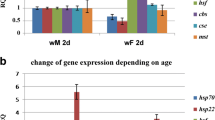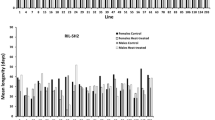Abstract
We demonstrate that natural heat stress on wild larval Drosophila melanogaster results in severe developmental defects in >10% of eclosing adults, and that increased copy number of the gene encoding the major inducible heat shock protein of D. melanogaster, Hsp70, is sufficient to reduce the incidence of such abnormalities. Specifically, non-adult D. melanogaster inhabiting necrotic fruit experienced severe, often lethal heat stress in natural settings. Adult flies eclosing from wild larvae that had survived natural heat stress exhibited severe developmental anomalies of wing and abdominal morphology, which should dramatically affect fitness. The frequency of developmental abnormalities varied along two independent natural thermal gradients, exceeding 10% in adults eclosing from larvae developing in warm, sunlit fruit. When exposed to natural heat stress, D. melanogaster larvae with the wild-type number of hsp70 genes (n=10) developed abnormal wings significantly more frequently than a transgenic sister strain with 22 copies of the hsp70 gene.
Similar content being viewed by others
Author information
Authors and Affiliations
Additional information
Received: 19 April 1999 / Accepted: 16 July 1999
Rights and permissions
About this article
Cite this article
Roberts, S., Feder, M. Natural hyperthermia and expression of the heat shock protein Hsp70 affect developmental abnormalities in Drosophila melanogaster . Oecologia 121, 323–329 (1999). https://doi.org/10.1007/s004420050935
Issue Date:
DOI: https://doi.org/10.1007/s004420050935




